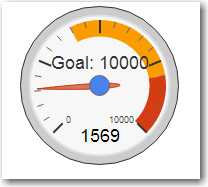In September of 2013, the National Institutes of Health Down Syndrome Consortium released the Down Syndrome Registry called DS-Connect. From the horse’s mouth, this project “will allow people with Down syndrome and their family members, researchers, and parent and support groups to share information and health history in a safe, confidential, online database.”
 It is estimated that there are somewhere between 250,000 to 400,000 people in the United States who have Down syndrome. As of this writing, only 1569 people have joined DS-Connect and entered data. It is a huge (and likely expensive) government-supported project that offers the community a way to collect and share critical statistical information with researchers, participants, and advocates, and yet so far it has been largely ignored. I’ve been wondering why that might be and have come up with a few things. If you think of a reason I missed, please leave it in the comments.
It is estimated that there are somewhere between 250,000 to 400,000 people in the United States who have Down syndrome. As of this writing, only 1569 people have joined DS-Connect and entered data. It is a huge (and likely expensive) government-supported project that offers the community a way to collect and share critical statistical information with researchers, participants, and advocates, and yet so far it has been largely ignored. I’ve been wondering why that might be and have come up with a few things. If you think of a reason I missed, please leave it in the comments.
Most People Haven’t Heard About It
My first guess is that it has not been widely publicized. In the grand scheme of things 250+ thousand people spread out all over this vast country is not really that much. Aside from reaching out on social media and via the large national Ds organizations, there is no easy and reasonably priced way to raise awareness about the project.
It’s Overwhelming
Of the people who heard about it and went to check it out, many found out that the sign up process requires you to go through the informed consent process prior to entering data about the person with Down syndrome. There is a bit to read and boxes to check, and although the process is estimated to take about 20 minutes, it is an arduous and intimidating 20 minutes that probably caused more than a few people to back out of signing up.
It’s Creepy
Perhaps by nature we are all a bit paranoid about sharing our personal data, but even if you weren’t, it doesn’t take long for the parents of a child with Down syndrome to become suspect about sharing information about their child. Parents fear that the information could be used to target their children, or that somehow they are aiding in the development of tests and other things that could be used to eradicate Down syndrome altogether.
It’s Complicated
I’m not talking about the website, but rather that the whole idea of having a registry for people with Down syndrome evokes a complicated response from many people. Parents want to see cures for the congenital defects that put babies with Down syndrome at risk, and for other threats such as Alzheimer’s and Leukemia, but no one is interested in the development of more prenatal tests or other research designed to do away with Down syndrome in the womb. And everything in-between? That is what’s complicated. Each parent, or advocate, has their own line somewhere of what is right for people with Down syndrome and what isn’t, but databases don’t know the difference… and maybe some researchers don’t either.
Four Good Reasons to Register Your Child
1. Once you register a child in DS-Connect, you’ll have access to the statistical information in the database. It is kind of cool to see how many other children have similarities to yours.
2. If scientists do have research breakthroughs and find something that your child is at risk for, or could benefit from, you can be informed, and will have options that you might not have known about otherwise.
3. The United States Congress (which spends a measly $50 per year per person with Ds on research) listened to a consortium of scientists and family advocates and created a database for our benefit that took a lot of resources and time. By signing up, you are showing them that we appreciate Congress’ willingness to put money toward Down syndrome. If we overwhelm them and blow through their goal of 10,000 signups, we send the message that people with Ds count, and that we want more for them.
4. By sharing statistical prenatal, birth, developmental, and health information about our loved ones, we are providing a valuable resource for scientists and helping move research along. Just imagine crunching the stats on 20 or 30 thousand records… what trends might appear? Our children hold the clues to a healthier future for themselves, and all who follow them.
So go sign your loved one up, and spread the word about DS-Connect.
Whoa. I hadn’t heard of this before! My initial reaction is to hesitate upon reading the following terms as connected with disability (physical, mental, or cognitive):
Medical Research
Health History
National Registry
Maybe it’s because I’ve read too much disability history as of late & I take a critical view of government-sponsored programs for people with intellectual disabilities in particular.
Just my initial reaction, for what it’s worth!
Thanks for the post 🙂
No, sorry, I don’t trust the federal government with information about my child that they do not value. Even if they are not nefarious, they are inept at protecting personal information. I heard about this when it was started, I will hear about any break throughout in Ds healthcare. But, sadly, and more likely I will first hear of more ways to detect and destroy babies with Ds before birth.
Any “breakthroughs in Ds healthcare” will likely be because of us parents who actually registered our children. You’re welcome.